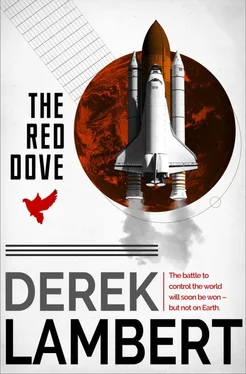Normally he liked to work out of doors, but not when the snow sweeping into the city from Siberia was so hard that it stung your face.
The man following Robert Massey was known to colleagues in Department V of the first Chief Directorate of the KGB as the Hunter. Off duty he hunted moose and wild boar on the taiga: on duty he hunted men, sometimes women.
Few – animals or humans – ever realised they were being pursued because, although he was a stocky man with an outdoor face and powerful, hair-tufted hands, the Hunter was capable of great stealth. He was also a chameleon: on a river beach on the Volga in summer he looked like a truck driver on vacation; at a diplomatic cocktail party, wearing a blue mohair suit and white shirt, black hair slicked back, he looked like a military attaché and his company was much coveted by women.
When, as now, he was part of the outdoors he always carried a knife. A special knife that he had designed. Like some bayonets it was grooved to facilitate withdrawal from a dead or dying body; it was also slightly curved so that if, for instance, it entered the back close to the spine its long blade would slice through the heart horizontally. But its great assets were the cutting edges of the blade: one was razor sharp, the other delicately saw-toothed so that, if the kill wasn’t clean, it could rip through tendon and bone and finish the job. He also carried a small Tula-Korovin 6.35 mm automatic, much favoured by the KGB because it was easy to conceal, but he much preferred to kill at close range with his knife.
A killing was for the Hunter the climax that rightfully lay at the end of any pursuit. He saw no moral objections to killing – death was ordained and he was merely its executioner – and he usually had an orgasm as the knife sunk home.
He was disappointed, therefore, that word had come from the top that this was not to be a mokrie dela, a wet affair. It was like sex without penetration. If, however, he discovered that an operative from a foreign intelligence agency was also keeping Massey under surveillance then he had authority to kill.
Massey reached the Zhiguli, a Fiat made in Russia under licence, and settled behind the wheel. The Hunter slid into the driving seat of his grey Volga. Both cars took off immediately because their engines had been left running to prevent them from seizing up in the cold. (The Hunter had poured vodka into his radiator because it was more efficient than Soviet anti-freeze.)
Massey drove in the direction of the block in which he had been allotted an apartment. The Hunter followed fifty yards behind; it was like pursuing a phantom. Snow pellets bounced off the windshield; above the whirr of the heating he could hear the tyres crunching the frozen slush.
When they stopped at a red light suspended in the snow the Hunter checked the TK in the shoulder holster beneath his jacket and the knife, sheathed and docile, strapped to his thigh.
The lights changed to blurs of green. Massey’s rear wheels spun, gripped. Two minutes later he turned into the parking lot behind the apartment block; he left the Zhiguli beside an area hosed with water to make a skating rink. The Hunter drew up beside the wall of the block and showed his identification to a fur-hatted militia-man who practically knelt when he saw it. ‘Just get the fuck away from me,’ the Hunter said, and the militiaman slunk back to his sentry box.
Head bowed, Massey ran across the lot to the entrance. As soon as he had disappeared the Hunter moved his Volga forward and switched on the receiver tuned to the bugs in Massey’s apartment. He heard a door open and slam; simultaneously a light came on in Massey’s apartment on the fourth floor.
As the light cut a square in the wall of the block the Hunter became aware that a fawn Moskvich had pulled into the lot. He waited for the driver to get out; the driver stayed put. The Hunter became interested. The snow had thinned but the late afternoon light was poor and he could only make out a silhouette. The silhouette removed its shapka and the features became sharper. Male. The Hunter assessed the tilt of the man’s head: it seemed to be aimed at Massey’s apartment; but that could be my imagination, wishful thinking.
Over the radio from Massey’s flat came the sonorous voice of a Voice of America newscaster. Something about a shuttle launching in Florida.
The Hunter climbed out of his Volga on the passenger side, out of the vision of the Moskvich driver, and made his way to the sentry box. The guard sprang to attention, relaxed a little when the Hunter said: ‘I’m not a general, you stupid prick.’ Although he was a major.
‘What can I do for you, Comrade?’ the sentry asked.
‘The Moskvich that just came in. Who was the driver?’
The sentry began to shiver. ‘I don’t—’
‘You must know. It’s your duty to identify any stranger who comes here.’
‘I don’t remember his name. But I did see from his identification papers that he was from East Germany.’
The Hunter made his way back to his Volga, blending with the dusk. He would be able to trace the Moskvich from its licence plate. An operative from a foreign intelligence agency… It was just possible that he was going to get lucky. The realisation made him sexually aroused.
Two days after Nicolay Talin gave a lecture at Tyuratam to a class of cadet cosmonauts in the last year of their training. His subject: First Impressions in Space. The idea was to teach the trainees to adapt to infinity; disorientation was still a problem despite all the attention psychologists had given it.
As he talked he was vaguely bothered by a face in the fifth row. It was familiar, but he couldn’t place it.
‘…as you probably know, considerable changes take place in your body in space due to the lack of gravity. Your face becomes larger due to the flow of blood from the lower extremities of your body. If you’ve got any wrinkles you’ll lose ’em. I know a few ladies who would like to have a journey in space…’ (Laughter).
The man in the fifth row was older than the other cadets.
‘…your waistline will shrink, your posture will change – you’ll crouch a little – and you’ll grow taller by anything up to two inches because, without the pull of gravity, the discs between your vertebrae won’t exert any restricting influence…’
And he had the air of a man who had heard it all before.
‘…Why’s he telling us all this old stuff? you’re asking yourselves. I’ll tell you – so you’ll ask yourselves, If this can happen to our bodies what can happen to our minds?’
Apples! The man who had bumped into him in the food store.
‘…I don’t mind telling you that the first time you gaze down on the earth and see how minute it is in relation to the rest of the firmament your brain seems to expand…’
Massey. Robert Massey. After the lecture Talin asked him to stay behind.
‘So,’ said Talin, ‘your work is secret. Do you mind telling me why you, an American, are being trained as a cosmonaut in the Soviet Union?’
‘Do you have half an hour?’
Talin consulted his wristwatch. ‘I was going for lunch…’
The help-yourself canteen was clinically clean with stainless steel chairs and white plastic tables. The food was wholesome, stuffed with vitamins. They chose tumblers of natural orange juice tinkling with ice, steaks and salad and yoghourt.
‘All right,’ Talin said, slicing a tomato, ‘explain.’
‘I defected,’ Massey said.
‘Mmmm.’ Talin drank some orange juice. ‘No one likes a traitor, Gaspadeen Massey.’ He frowned. ‘But I remember you now. You piloted the command module on a lunar flight. Why-’
‘– did I defect? Have you ever felt you were going crazy?’
Читать дальше
Конец ознакомительного отрывка
Купить книгу












